高考英语情态动词经典习题(含答案)
高考英语情态动词单选题20题
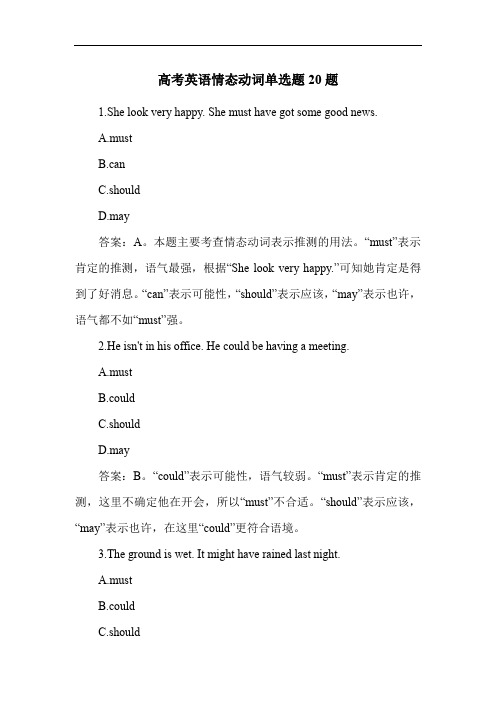
高考英语情态动词单选题20题1.She look very happy. She must have got some good news.A.mustB.canC.shouldD.may答案:A。
本题主要考查情态动词表示推测的用法。
“must”表示肯定的推测,语气最强,根据“She look very happy.”可知她肯定是得到了好消息。
“can”表示可能性,“should”表示应该,“may”表示也许,语气都不如“must”强。
2.He isn't in his office. He could be having a meeting.A.mustB.couldC.shouldD.may答案:B。
“could”表示可能性,语气较弱。
“must”表示肯定的推测,这里不确定他在开会,所以“must”不合适。
“should”表示应该,“may”表示也许,在这里“could”更符合语境。
3.The ground is wet. It might have rained last night.A.mustB.couldC.shouldD.might答案:D。
“might”表示可能性较小的推测。
“must”表示肯定的推测,“could”可能性比“might”大一些,“should”表示应该,这里说地面湿了,只是有可能昨晚下雨了,所以“might”最合适。
4.There is a lot of noise coming from the next room. They must be having a party.A.mustB.canC.shouldD.may答案:A。
“must”表示肯定的推测,根据“There is a lot of noise coming from the next room.”可以推断出他们肯定在开派对。
“can”表示可能性,“should”表示应该,“may”表示也许,语气都不如“must”强。
高考英语情态动词练习题50题(答案解析)

高考英语情态动词练习题50题(答案解析)1.You be careful when crossing the road.A.mustB.canC.mayD.might答案解析:A。
“must”表示必须,过马路的时候必须小心,这是一种强烈的要求。
“can”表示能够,“may”表示可能,“might”表示可能性比“may”更小,这三个选项都不符合过马路要小心这个强烈的要求。
涉及的语法规则是“must”表示必须做某事。
2.She come to the party tonight,but I'm not sure.A.mayB.mustC.canD.will答案解析:A。
“may”表示可能,她今晚可能来参加派对,因为不确定。
“must”表示必须,语气太强烈;“can”表示能够;“will”表示将要,这三个选项都不符合不确定的语境。
涉及的语法规则是“may”表示可能性。
3.You finish your homework before you watch TV.A.mustB.canC.mayD.might答案解析:A。
“must”表示必须,先完成作业才能看电视,是一种规定。
“can”表示能够,“may”表示可能,“might”表示可能性比“may”更小,这三个选项都不符合规定的语境。
涉及的语法规则是“must”用于表示必须做某事。
4.He be very tired after a long day at work.A.mustB.canC.mayD.might答案解析:A。
工作了一整天后他肯定很累,“must”表示肯定的推测。
“can”表示能够,“may”表示可能,“might”表示可能性比“may”更小,这三个选项都不如“must”的推测强烈。
涉及的语法规则是“must”表示肯定的推测。
5.We take an umbrella.It might rain later.A.mustB.canC.mayD.should答案解析:D。
高中英语情态动词形式单选题60题(含答案)
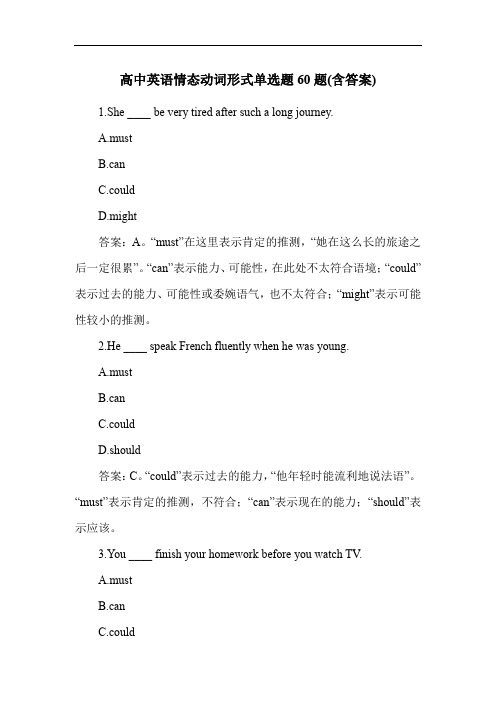
高中英语情态动词形式单选题60题(含答案)1.She ____ be very tired after such a long journey.A.mustB.canC.couldD.might答案:A。
“must”在这里表示肯定的推测,“她在这么长的旅途之后一定很累”。
“can”表示能力、可能性,在此处不太符合语境;“could”表示过去的能力、可能性或委婉语气,也不太符合;“might”表示可能性较小的推测。
2.He ____ speak French fluently when he was young.A.mustB.canC.couldD.should答案:C。
“could”表示过去的能力,“他年轻时能流利地说法语”。
“must”表示肯定的推测,不符合;“can”表示现在的能力;“should”表示应该。
3.You ____ finish your homework before you watch TV.A.mustB.canC.could答案:A。
“must”表示必须,“你必须在看电视之前完成作业”。
“can”表示能力、可能性;“could”表示过去的能力、可能性或委婉语气;“may”表示可能。
4.____ I borrow your pen?A.MustB.CanC.CouldD.Will答案:B。
“Can I...?”表示请求,“我能借你的笔吗?”“Must”表示必须,语气太强;“Could”用于更委婉的请求,但不如“Can”常用;“Will”表示将来。
5.She ____ have forgotten her keys. She's always so careful.A.can'tB.mustn'tC.shouldn'tD.needn't答案:A。
“can't”表示否定的推测,“她不可能忘了钥匙,她总是很细心”。
“mustn't”表示禁止;“shouldn't”表示不应该;“needn't”表示不必。
高中英语情态动词形式练习题40题含答案解析
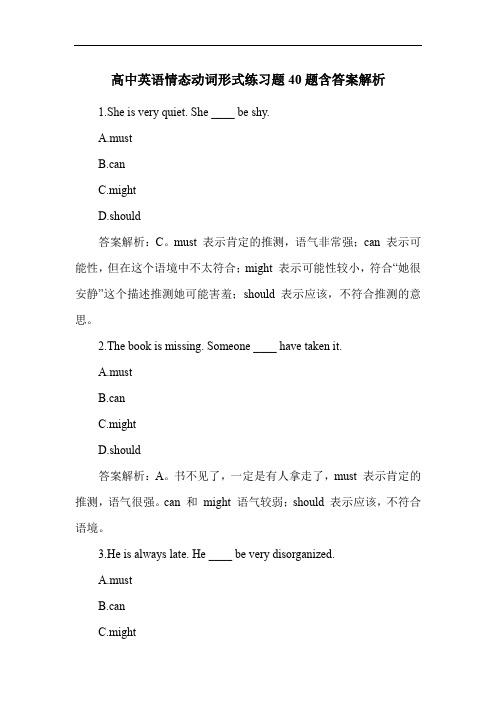
高中英语情态动词形式练习题40题含答案解析1.She is very quiet. She ____ be shy.A.mustB.canC.mightD.should答案解析:C。
must 表示肯定的推测,语气非常强;can 表示可能性,但在这个语境中不太符合;might 表示可能性较小,符合“她很安静”这个描述推测她可能害羞;should 表示应该,不符合推测的意思。
2.The book is missing. Someone ____ have taken it.A.mustB.canC.mightD.should答案解析:A。
书不见了,一定是有人拿走了,must 表示肯定的推测,语气很强。
can 和might 语气较弱;should 表示应该,不符合语境。
3.He is always late. He ____ be very disorganized.A.mustB.canC.might答案解析:A。
他总是迟到,肯定是非常没有条理,must 表示肯定的推测,语气强。
can 和might 可能性较小;should 表示应该,不合适。
4.The lights are on. Someone ____ be at home.A.mustB.canC.mightD.should答案解析:A。
灯亮着,肯定有人在家,must 表示肯定的推测,语气强。
can 和might 可能性较小;should 表示应该,不符合语境。
5.The test was very difficult. She ____ have passed it.A.mustB.canC.mightD.should答案解析:C。
考试很难,她可能通过了,might 表示可能性较小。
must 语气太强;can 表示可能性,但不太符合这个语境;should 表示应该,不符合推测的意思。
6.He looks very tired. He ____ have worked hard.A.mustB.canD.should答案解析:A。
高中英语情态动词专项练习200题(含答案)
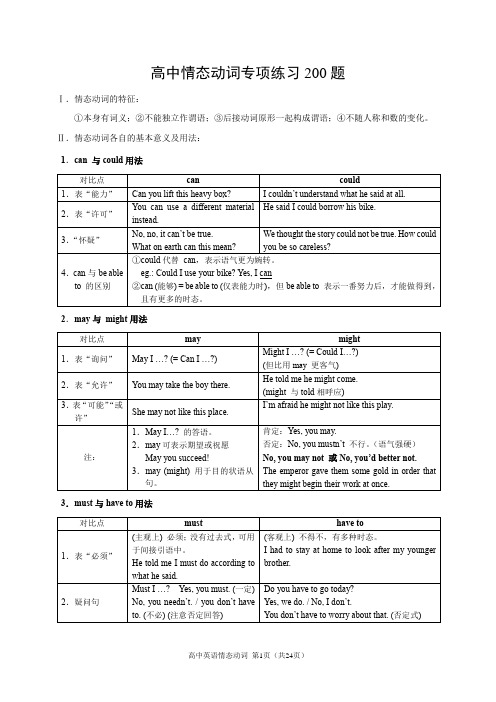
高中情态动词专项练习200题Ⅰ.情态动词的特征:①本身有词义;②不能独立作谓语;③后接动词原形一起构成谓语;④不随人称和数的变化。
Ⅱ.情态动词各自的基本意义及用法:1.can 与could用法2.may与might用法3.must与have to用法4.need与dare用法5.should与ought to用法6.shall与will用法7.used to与would用法Ⅲ.情态动词表推测:1.大多数情态动词(除表‘能力、许可、意志’外),都可以表示推测,其程度有差异。
按可能性程度的高低排列为:must﹥will ﹥would ﹥ought to ﹥should完全肯定完全可能很可能﹥can ﹥could﹥may ﹥might可能有可能2.区分情态动词的否定含义:may not或许不、可能不might not可能不can’t 不可能mustn’t不许、禁止shouldn’t不应该needn’t 不必3.情态动词表推测具体运用:情态动词可以对现在、进行、过去推测。
4.表示反劝的特殊的表推测形式5.注意:Ⅳ.情态动词表推测的反意疑问句1.情态动词表推测的反意疑问句,简单来说,就是以情态动词后的时态为淮,如句子里有明确的时间状语,则以其为准。
2.以must 为例:e.g.: 1.You must be hungry now, aren’t you?2.He must be watching TV , isn’t he ?3.Tom must have lived her for a long time, hasn’t he ?4.She must have arrived yesterday, didn’t she?注:如选择题中(以She must have arrived yesterday, didn’t she?为例)既有didn’t she又有hasn’t she 则以didn’t she?为最佳答案。
高考英语情态动词推测运用练习题20题

高考英语情态动词推测运用练习题20题1.He is always reading books. He must be very interested in literature.A.mustB.mayC.mightD.could答案:A。
“must”在这里表示肯定的推测,语气最强。
他总是在读书,所以一定对文学很感兴趣。
“may”“might”“could”虽然也可以表示推测,但语气较弱,不符合这里的语境。
2.She has a lot of knowledge about art. She could be an art major.A.mustB.mayC.mightD.could答案:D。
“could”在这里表示比较委婉的推测。
她有很多关于艺术的知识,有可能是艺术专业的。
“must”语气太强硬,“may”“might”也可以表示推测,但不如“could”委婉。
3.The man is wearing a suit and tie. He might be going to a formal event.A.mustB.mayC.might答案:C。
“might”在这里表示比较弱的推测。
这个男人穿着西装打着领带,可能是要去一个正式的活动。
“must”语气太肯定,“may”“could”也可以表示推测,但“might”更符合语境。
4.The room is very clean. She may have cleaned it.A.mustB.mayC.mightD.could答案:B。
“may”在这里表示有可能的推测。
房间很干净,她有可能打扫了。
“must”语气太强硬,“might”“could”也可以表示推测,但“may”更符合语境。
5.There are many books on the desk. He could be a student.A.mustB.mayC.mightD.could答案:D。
高考(完整版)情态动词专题(练习题含答案)
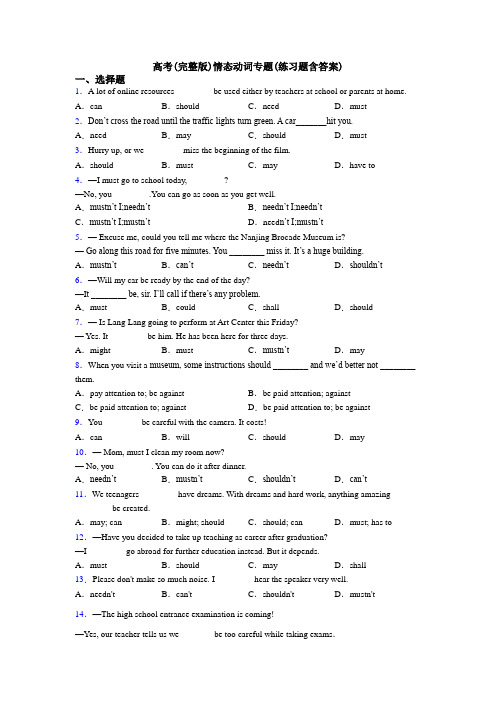
高考(完整版)情态动词专题(练习题含答案)一、选择题1.A lot of online resources ________ be used either by teachers at school or parents at home. A.can B.should C.need D.must2.Don’t cross the road until the traffic lights turn green. A car_______hit you.A.need B.may C.should D.must3.Hurry up, or we ________ miss the beginning of the film.A.should B.must C.may D.have to4.—I must go to school today, ________?—No, you ________.You can go as soon as you get well.A.mustn’t I;needn’t B.needn’t I;needn’tC.mustn’t I;mustn’t D.need n’t I;mustn’t5.— Excuse me, could you tell me where the Nanjing Brocade Museum is?—Go along this road for five minutes. You ________ miss it. It’s a huge building. A.mustn’t B.can’t C.needn’t D.shouldn’t 6.—Will my car be ready by the end of the day?—I t ________ be, sir. I’ll call if there’s any problem.A.must B.could C.shall D.should7.— Is Lang Lang going to perform at Art Center this Friday?— Yes. It ________ be him. He has been here for three days.A.might B.must C.mustn’t D.may8.When you visit a museum, some instructions should ________ and we’d better not ________ them.A.pay attention to; be against B.be paid attention; againstC.be paid attention to; against D.be paid attention to; be against9.You ________ be careful with the camera. It costs!A.can B.will C.should D.may10.— Mom, must I clean my room now?— No, you ________. You can do it after dinner.A.needn’t B.mustn’t C.shouldn’t D.can’t11.We teenagers ________ have dreams. With dreams and hard work, anything amazing________ be created.A.may; can B.might; should C.should; can D.must; has to 12.—Have you decided to take up teaching as career after graduation?—I ________ go abroad for further education instead. But it depends.A.must B.should C.may D.shall 13.Please don't make so much noise. I ________ hear the speaker very well.A.needn't B.can't C.shouldn't D.mustn't 14.—The high school entrance examination is coming!—Yes, our teacher tells us we _______ be too careful while taking exams.A.mustn't B.shouldn't C.needn't D.can't15.You ______ pay too much attention to your pronunciation, as it is so important in the oral (口头的) test.A.shouldn’t B.mustn’t C.can’t D.needn’t 16.—Would you please________in that way? That’s not safe!—Sorry. I won’t do it any more.A.not driving B.not to drive C.no driving D.not drive 17.Dr. Zhong Nanshan once said, "To prevent the spread of this disease, we________never be too careful."A.can B.may C.must D.should18.—Will your mother be at home this Saturday?—Hard to say. She _______go to the countryside to see my grandparents.A.must B.may C.can D.would19.Think twice before making a decision, or you __________ get into trouble.A.may B.can't C.shouldn't D.mustn't20.I ________ hear you clearly. Would you please repeat it?A.mustn’t B.can’t C.needn’t D.shou ldn’t 21.Look at the floor, Tom! ________ you watch TV while having a meal?A.Should B.Could C.Must D.May22.You _________ smoke here! Look at the sign. It says "No smoking".A.needn't B.mustn't C.can D.may23.— Listen! Tom ________ be listening to the music while doing his homework.—Let’s go upstairs to remind him to turn it off.A.should B.could C.would D.must24.—Will Jim come to Yangzhou for a holiday?—He ________come and it depends on how much homework he will have.A.may B.should C.must D.need25.—In China, many parents complain that their children have to stay up late to do the homework.—Don’t worry. The government has realized the problem. I’m sure there ________ be good news soon.A.can B.should C.need D.must26.I think all the students love the weekends because, to them, they ________ get up early on Saturdays or Sundays.A.mustn’t B.don’t need C.needn’t D.can’t27.When people are waiting at the zebra crossing, cars and buses ________ wait and let them go first.A.must B.may C.can D.need28.—Shall I tell him the change of the time right now?—I’m afraid you ________, otherwise he will be late for the meeting.A.can B.may C.must D.need29.It’s of great importance to protect the environment. Each of us ________ take an active part in it.A.can B.may C.would D.should 30.—Must we stop the Japanese government discharging nuclear waste water (排放核污水) into the Pacific Ocean?—________. Because everyone should protect our earth and it is bad ________ us to eat the polluted seafood and drink the waste water.A.Yes, we can; of B.No, we mustn’t; of C.Yes, we must; for D.No, we needn’t; for 31.According to the rule, used batteries ________ be dropped in the red bin for harmful wastes. A.may B.would C.should D.might32.Cars ________ give way to walkers on some roads in Binhai, or the drivers will be fined. A.may B.will C.can D.must33.Mr. Black ________ be at home now. He went abroad on vacation last Friday.A.can’t B.mustn’t C.needn’t D.shouldn’t 34.—How beautiful the winter jasmines (迎春花) are!—Yes. These golden-yellow flowers ________ be widely seen in my city in March.A.must B.can C.would D.should35.— What do you think of the show yesterday?— Some of them were really good but others ________ be better.A.will B.must C.need D.can 36.—Who’s the man over ther e? Is that Mr. Black?—It ________ be him. Mr. Black is much taller than that man.A.may B.must C.can’t D.mustn’t37.—________ I see your ID card? We have to check your personal information.—Sure. Here you are.A.May B.Need C.Should D.Must38.—I don’t care what people think.—Well, you _______ . Some opinions are worth weighing.A.should B.might C.could D.would39.—I think they are enough. We ________ make so many chairs.—I don’t think so. Because nearly a quarter of them need ________.A.don’t need to; mending B.needed; to be mendedC.don’t need; mend D.need; to mend40.—Seventy dollars for such a dress! You ________ be joking!—I’m serious. It’s made of silk from Hangzhou.A.must B.need C.will D.can【参考答案】一、选择题1.A解析:A【详解】句意:很多在线资源既可以供学校的老师使用,也可以供家长在家使用。
高中英语情态动词形式练习题40题含答案解析
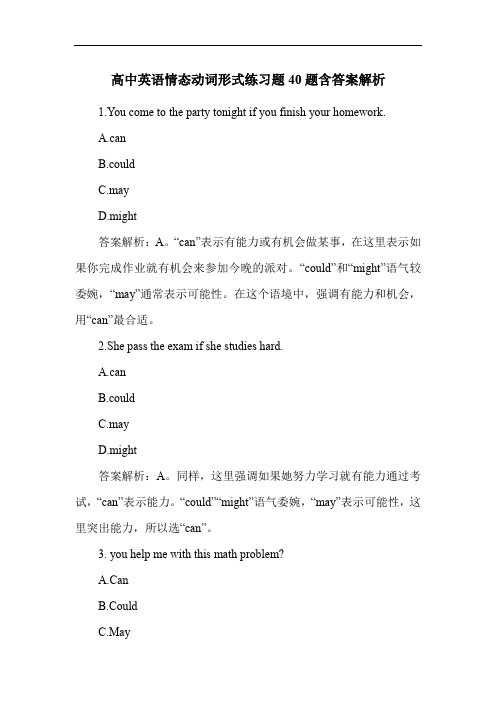
高中英语情态动词形式练习题40题含答案解析1.You come to the party tonight if you finish your homework.A.canB.couldC.mayD.might答案解析:A。
“can”表示有能力或有机会做某事,在这里表示如果你完成作业就有机会来参加今晚的派对。
“could”和“might”语气较委婉,“may”通常表示可能性。
在这个语境中,强调有能力和机会,用“can”最合适。
2.She pass the exam if she studies hard.A.canB.couldC.mayD.might答案解析:A。
同样,这里强调如果她努力学习就有能力通过考试,“can”表示能力。
“could”“might”语气委婉,“may”表示可能性,这里突出能力,所以选“can”。
3. you help me with this math problem?A.CanB.CouldC.May答案解析:B。
这里用“could”表示委婉地请求,“can”语气较直接,“may”和“might”在这个语境中不太符合请求的语气。
4.I ask you a question?A.CanB.CouldC.MayD.Might答案解析:C。
“may”用于请求许可比较正式,“can”也可以用于请求但相对不那么正式,“could”和“might”语气委婉但在这里不太符合直接请求的语境。
5. he come to school late today?A.CanB.CouldC.MayD.Might答案解析:D。
“might”在这里表示对可能性的较小推测,他今天有可能会迟到吗?“can”和“could”通常不用于这种较小可能性的推测,“may”也不太符合这个语境。
6. you lend me your pen?A.CanB.CouldD.Might答案解析:B。
“could”表示委婉地请求借笔,“can”语气较直接,“may”和“might”不太符合请求借东西的语境。
- 1、下载文档前请自行甄别文档内容的完整性,平台不提供额外的编辑、内容补充、找答案等附加服务。
- 2、"仅部分预览"的文档,不可在线预览部分如存在完整性等问题,可反馈申请退款(可完整预览的文档不适用该条件!)。
- 3、如文档侵犯您的权益,请联系客服反馈,我们会尽快为您处理(人工客服工作时间:9:00-18:30)。
【答案】A
【解析】
【详解】
考查情态动词。句意:在我十几岁的时候,我经常感到烦恼,我的奶奶会安慰我说,“生活就是这样,亲爱的”。此处是would+动词原形,表示“过去总是做某事”。故选A。
7.It has been announced that all the students ________ put on masks before going to school in case they are infected with SARS virus.
【解析】
【详解】
考查情态动词辨析。句意:——困难总是伴随着我!——高兴点!如果上帝在你面前关上了门,一定有一扇窗户为你打开。A. must必须;B. would将要;C. could能,会;D. can能,会。must表示对现在的状态推测时,意为“一定”,表示可能性很大的推测。符合语境。故选A。
【点睛】
考点:考察情态动词
10.—You rang me up at about 10:00 last night, didn't you?
—No, I didn't phone you. Itsomeone else.
A.must have beenB.could beC.must beD.could have been
1) must用在肯定句中表示较有把握的推测,意为"一定"。
2) must表对现在的状态或现在正发生的事情的推测时,must后面通常接系动词be的原形或行为动词的进行式。
3) must表示对已发生的事情的推测时,must要接完成式。
4) must表示对过去某时正发生的事情的推测,must后面要接完成进行式。
A.must findB.might findC.should have foundD.must have found
【答案】D
【解析】
【详解】
考查must have done结构。句意:——吉姆一定觉得我说的话很让人烦,尽管他什么也没说。——所以你是说你得向他道歉?根据“though he didn’t say anything.”可知此处表示对过去事情的肯定推测,用must have done表示“过去一定做了……”,故D项正确。
考点:考查情态动词
2.Most of the top leaders expressed a common desire at the UN conference, ______ that different cultures ______ coexist with tolerance.
A.the one ; mustB.the one ; shouldC.one ; mustD.one ; should
5)否定推测用can't。
本句中的。must表示对现在的状态推测时,意为一定,表示可能性很大的推测。符合第2点用法。
16.— Jim ________ what I said annoying though he didn’t say anything.
— So you mean you will have to apologize to him?
高考英语情态动词经典习题(含答案)
一、单项选择情态动词
1.You ________ give me a lift. I want to walk home for exercise.
A.needn’tB.couldn’tC.can’tD.mustn’t
【答案】A
【解析】
【详解】
考查情态动词。句意:你不必让我搭车。我想步行回家锻炼身体。A. needn’t不必;B. couldn’t不能;C. can’t不会;D. mustn’t禁止,不允许。根据I want to walk home for exercise.可知,你不必让我搭车。故选A。
11.—_______ you disturb me now? I’m busy preparing a report.
— Terribly sorry, but I have something urgent to tell you.
A.NeedB.ShouldC.MightD.Must
【答案】D
【答案】A
【解析】
【详解】
考查情态动词+have done。句意:“昨晚10点左右你给我打了电话,是吗?”“不,我没给你打电话。一定是别人干的。” must have done是对过去发生的动作最有把握的猜测,意思是“一定”,结合语境可知,我没有打电话给你,因此猜测一定有别人给你打了电话。故选A项。
13.The door ________ open, no matter how hard she pushed.
A.shouldn’tB.couldn’t
C.wouldn’tD.mightn’t
【答案】C
【解析】
【详解】
考查情态动词。句意:无论她怎么使劲推,门就是打不开。A. shouldn’t不应该;B. couldn’t不能够;C. wouldn’t不愿意;D. mightn’t可能不。will及其过去式would均可表示一种倾向性、习惯。故选C。
A.shallB.willC.needD.may
【答案】A
【解析】
【详解】
【详解】
考查情态动词。句意:所有学生们应在去学校之前带上口罩以防感染非典病毒,这已经被宣布。shall用于第二、第三人称,表示说话人给对方命令、警告、允诺或威胁,故选A项。
8.Our English teacher is considerate,helpful,and warm-hearted,but sometimes she________________ be angry at our silly mistakes.
14.It ________ be the postman at the door. It's only six o'clock.
A.mustn'tB.can't
C.won'tD.needn't
【答案】B
【解析】
D[考查虚拟语气。句意:不可能是邮递员在门口,才六点钟呢。mustn't禁止,不允许;can't不可能;won't不愿意,就是不,偏不;needn&讲比赛中表现得很好。他上星期一定练习了很多次。must have done是对过去发生的动作最有把握的猜测,意思是“一定”。故C选项正确。
5.He is a bad-tempered fellow, but he ________ be quite charming when he wishes.
17.Mr. Smith is almost on time for everything. How ________ it be that he was late for the meeting?
A.canB.shouldC.mayD.must
【答案】A
【解析】
【详解】
考查情态动词辨析。句意:史密斯先生几乎任何事情都是准时的。他怎么可能开会迟到了?A. can可能,可能性,表示可能性时,常用于否定句和疑问句中,且有时还带有“惊奇、不相信”等感情色彩。B. should应该;C. may也许,表示可能性时常用于肯定句中,不用于疑问句中。D.must常用于肯定句中表推测,“一定……”的意思;本题是强调句型的一个变式:强调其特殊疑问句how的形式。根据前句“斯密斯先生几乎是很准时”可推测出“怎么可能开会迟到呢?”。根据句意可知,用于疑问句中的“可能性”且有不相信的色彩,四个选项只有“can”符合题意。故选A
【点睛】
that ,it ,one代指前面的名词时的用法
1.one指代前面出现的可数名词,是泛指。可以和冠词连用,也可以有自己的定语。一般不能用做特指,但和定冠词连用时可以是特指。如:Please show me the cup, the red one on the shelf.
2.It指代前面提到的单数名词,相当于the one。当one是泛指的时候,指的是同名异物,it是指同一物体.如:----Do you want the cup ? ---Yes ,I want it.
--- That’s really bad. I’m sure you ______ it, but you just didn’t hurry up.
A.had caughtB.could have caughtC.could catchD.can catch
【答案】B
【解析】
【详解】
考查情态动词+have done结构。句意:——哦,我的上帝!我刚好错过了回家的末班车。——这是非常糟糕的。我肯定你能赶上,但你就是不抓紧。could have done“本来能做而没有做”。故选B。
12.---Is Jack on duty today?
---It ________ be him. It's his turn tomorrow.
A.mustn'tB.won'tC.can'tD.needn't
【答案】C
【解析】
【详解】
考查情态动词表示推测。句意:--今天杰克值日吗?--不可能是他。明天该轮到他。can’t be用于否定推测“不可能是”,must表示推测的时候,表示“肯定是”,won’t不愿意,needn’t不必,故选C。
4.Paul did a great job in the speech contest. Hemany times last week.
A.need have practisedB.might practise
